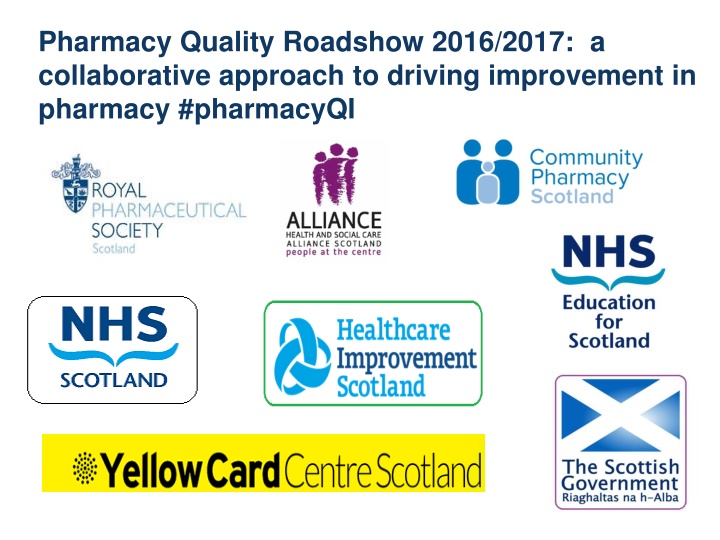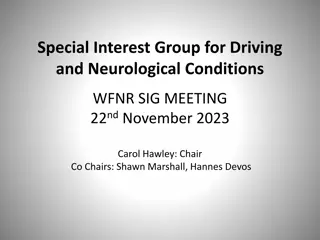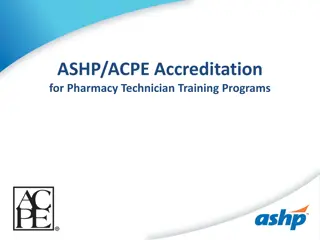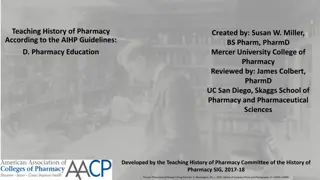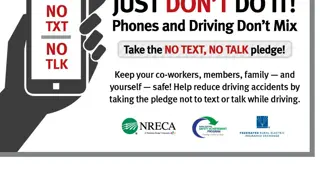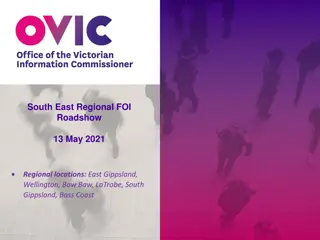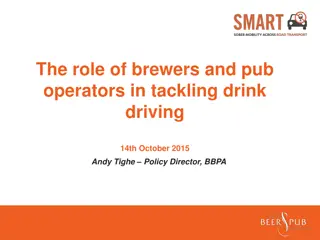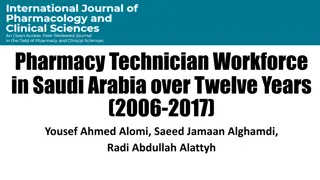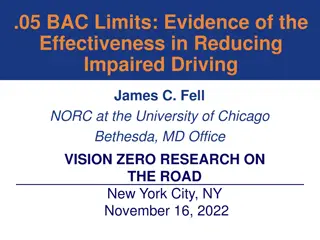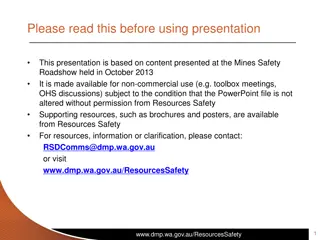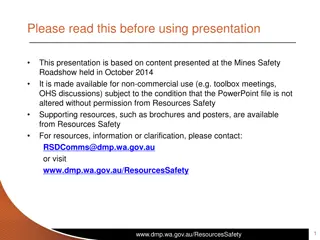Pharmacy Quality Roadshow 2016/2017: Driving Improvement in Pharmacy
Experience the collaborative approach of the Pharmacy Quality Roadshow 2016/2017 to enhance pharmacy practices and elevate quality standards. Join the movement towards driving positive change and improvement in the pharmacy domain. Explore innovative strategies, insights, and best practices shared during the roadshow to uplift pharmacy quality and patient care. Be part of this transformative journey towards excellence in pharmacy services.
Download Presentation

Please find below an Image/Link to download the presentation.
The content on the website is provided AS IS for your information and personal use only. It may not be sold, licensed, or shared on other websites without obtaining consent from the author.If you encounter any issues during the download, it is possible that the publisher has removed the file from their server.
You are allowed to download the files provided on this website for personal or commercial use, subject to the condition that they are used lawfully. All files are the property of their respective owners.
The content on the website is provided AS IS for your information and personal use only. It may not be sold, licensed, or shared on other websites without obtaining consent from the author.
E N D
Presentation Transcript
Pharmacy Quality Roadshow 2016/2017: a collaborative approach to driving improvement in pharmacy #pharmacyQI
Pharmacy Quality Roadshow- Workshop Objectives After participating in this workshop, you will be able to; 1. Understand what Quality Improvement means. 2. Understand the background to the Scottish Government PCA 3. Understand what the Rebalancing Legislation and Regulation Programme means 4. Describe the impact of dispensing errors and the benefits of sharing from all errors 5. Understand the Safety Climate Survey and how to complete it. 6. Use the safety climate survey to prevent/reduce the risks of re- occurrence of dispensing errors. 7. Identify ways to increase reporting, learning, sharing and action within pharmacy teams. 8. Describe the opportunities available for peer review and support
Mistakes are a fact of life. It is the response to error that counts.
HIS Infographic Quiz How many non-elective hospital admissions are due to medicines? What percentage of over 70 year olds are prescribed 5 or more medicines? How many prescribing errors each year are recorded in primary care?
Talking about quality and safety is like talking about fruit and apples . Safety cannot be divorced from quality. Don Berwick, President Emeritus & senior fellow at the Institute for Healthcare Improvement
UK Rebalancing Programme This is a move away from prosecution through a process of evolution in pharmacy practice. Supporting delivery will require.....A continuous focus on safety for patients and the public through increased reporting of errors and increased learning
Why report and review errors and events? AIM: To design a system that supports people better and makes it easier to do the right thing every time. Understand why things go wrong Understand why things go right Taken from Implementing Human Factors in Healthcare www.patientsafetyfirst.nhs.uk
Human Factors Human Error is where someone makes a genuine mistake Human Factors is where a system forces you into making an error. https://www.youtube.com/watch?v=usVus9ia-q0
Quality improvement in Pharmacy and Primary Care - Safety Climate Survey Complete the 8 modules on the QI Hub This then leads on to the Safety Climate survey. This has a focus on 5 different domains. -http://www.sehd.scot.nhs.uk/pca/PCA2016( P)15.pdf
Dispensing Errors include: Legislative issues Clinical checking errors Medication supply errors Documentation errors Counselling errors
Dispensing Error Medication Supply External errors: Incidents detected and reported after medication has left pharmacy. Internal errors or near misses: Incidents identified during dispensing before medication has left pharmacy. It has been made clear that greater recording, learning and action is required for internal errors and near misses in particular. This will require cultural and behaviour change within pharmacy teams. (James K.L. et al. (2009). Incidence, type and causes of dispensing errors: a review of the literature. Int J Pharm Pract. 17, 9-30
The incident iceberg and importance near misses and insignificant errors (Smith, 2004)
Some Barriers & Defences to reduce/prevent errors: Workload and staffing Design of computer system Lack of staff knowledge and skills Interruptions and distractions Design of dispensary Communication
Barriers to Reporting Organisational Controllable/ modifiable Individual Lack of anonymous reporting mechanisms Belief that near-misses don t need reporting Lack of time Availability of critical incident forms Not knowing who is or should be responsible for reporting the incident Not recognising the usefulness of reporting Complexity of forms Lack of information on what, where, to whom and when an incident should take place Fear of reprisal Organisational climate and tradition Severity of the error Lack of interest toward reporting Culture of blame Less controllable/ modifiable Uribe, 2002
The patients perspective on dispensing errors Everyone makes mistakes, I trust them to take steps to make sure it doesn t happen again I know you made a mistake. All I want you to do is send flowers to my mum, she has been worried sick
Getting the culture right - Where we are now? Punitive culture: punishment Stifles Reduction in patient safety and quality reporting and learning
Why no-blame is not enough Not acceptable socially. Unfair. Negative impact on quality Lack of accountability - complacency No-blame culture: blanket immunity
We need the right culture, a just, open, safe and fair culture underpinned by quality improvement Fair working environment Improved patient experience, patient safety and clinical effectiveness = quality Open culture Reporting culture Learning Culture Transparency Safety Culture: Safe systems Quality improvement Communication Just Culture balanced accountability and learning
Responsibility and Accountability Is it the person carrying out the final accuracy check that is accountable for the error? Responsibility - something that is your job or duty to deal with. Accountability - someone who is accountable is completely responsible for what they do and must be able to give a satisfactory reason for it.
Workshop questions impact & culture Workshop question 1 In your groups discuss your experience of dispensing errors, their impact and what the proposed legislative changes to the criminal offence for inadvertent dispensing errors mean to you. How would you define the culture you are working in just now (punitive, no blame, just or safe etc.)? (15 minutes)
Workshop question 2 Agree what is going well or three top tips to reduce dispensing errors and feedback to the larger group. (10 minutes)
Quality Improvement Tools Do you currently use any QI tools? How are Near Miss Logs used? Are these reviewed regularly?
Workshop case and quality improvement tools While working late one busy afternoon in a community pharmacy, you receive a call from a concerned carer. They report that a patient had received their medication through your delivery service this morning, but she also received another patient s medicine as well. Shortly after another carer calls to say that one of her patients has not received their medication. After speaking to the driver it transpires that: The driver was a temporary driver and this was his first day working in the area Both patients had similar addresses, one living in 8 Smith Ave, the other 8 Smith Rd. The patient who received the medication could not remember receiving two different packages. She was elderly and confused. It was common for more than one package to be delivered to the same address.
Case example and route cause analysis Workshop question A. In your group discuss how you would approach this and what you think the contributing factors may have been. (5 Minutes)
Case continued, applying quality improvement tools However, a root cause analysis (RCA) highlighted the following; That the driver was not aware of the SOP and had not been accompanied on a trial run prior to the day of the incident The delivery log allowed the signature of the person receiving the medication to be recorded, but not the number of packages received. The dispensary team were aware that two patients had an almost identical address, but failed to highlight this to the driver Neither the dispensary team nor the delivery log highlighted where more than one bag was being delivered to the same address. The driver did not highlight to the pharmacist at the end of his run that a patient listed on the delivery log did not receive any medication.
Undertaking root cause analysis Workshop question B: In your group discuss and complete the 5 whys tool based on the information you have. (10 minutes). Now that you have identified the contributing factors. How do you prioritise what you need to change?
Individual (staff) factors: Communication factors: Patient factors: Task factors: Team factors: Problem or issue (CDP/SDP) Equipment + resources: Education + Training Factors: Working condition factors: Organisational + strategic factors:
Individual (staff) factors: Communication factors: Patient factors: Task factors: Team factors: Pt elderly & confused Driver was worried about sick relative SOP for recording 2 packages? Communication not with pts Similar addresses Driver didn t highlight possible error at end of run. Pt has poor eyesight Process for highlighting similar names? Dispenser doesn t like driver Lack of continuity of pharmacists Staff unaware of responsibilities Process for daily review of delivery log? Staff demotivated Too much to deliver in given time Delivery of medicines by new driver to wrong patient Consultation Rm used to store deliveries Staff focus is Rx bag at this time Review near- miss? No one is available to supervise driver Lack of computer terminals Deliveries done at lunch at time Care home day Driver is dyslexic Staff aware, but similar names not highlighted. Delivery log, no number of packages Not accompanied Organisation of delivery items Temp driver Education + Training Factors: Equipment + resources: Working condition factors: Organisational + strategic factors:
Insanity: doing the same thing over and over again and expecting different results Albert Einstein, (attributed) US (German-born) physicist (1879 - 1955)
Your Pharmacy Team Safety Climate Survey All members of the pharmacy team should be involved and asked to complete the online survey. There are 5 domains for consideration: Team Working Safer systems and learning Communications Working conditions Leadership Once completed a report will be available for the pharmacy team to review. Use the feedback meeting to try and discuss in an open and constructive manner . Identify the areas for improvement and discuss as a team how these could be improved.
Support from NES Significant Event Analysis (SEA) Peer reviewed (anonymous and feedback provided in ~4 weeks) Now Enhanced SEA to help teams apply human factors thinking Audit Peer review (anonymous and feedback provided in ~4 weeks) PBSGL (Practice Based Small Group Learning) Evidence based approach to learning Membership required (sponsorship available from NES Pharmacy) Share your experience and learning with peers whom you trust Apply for membership: https://response.questback.com/nhseducationforscotland/hc63juqzah/ For more information from NES: http://www.nes.scot.nhs.uk/education-and-training/by-discipline/pharmacy.aspx The QI Workforce Development Tool is an online system designed to allow individuals working in Health and Social Care Partnerships to assess their own levels of capability and confidence in a range of areas of expertise relating to QI. http://www.qiwfdevtool.nes.scot.nhs.uk/
Other support available RPS Near miss/error log and top tips guide RPS Just Culture Guidance NPA resources GPhC resources QiHub www.Pharmacyqs.com Resources to support the safety climate survey can be found at http://www.scottishpatientsafetyprogramme.scot.nhs.uk/pro grammes/primarycare/pharmacy-in-primary-care.
Next Steps If not already done complete the learning modules on QI hub website, to be completed by 30th Sept 2017 Start planning how to undertake your safety climate survey which has to be completed by 30th Sept 2017 If you are unsure, contact your local Pharmacy Champion with any questions regarding PCA requirements or Quality Improvement
Conclusion The best way to reduce harm is for the NHS to embrace wholeheartedly a culture of learning. Don Berwick Be open Say sorry and take responsibility for taking appropriate action Take a systems view what happened? How do we prevent it in the future? Include human factors in any review Design a system that supports people better and makes it easier to do the right thing every time ! But design for reality... and implement... Share widely via a number of mechanisms Keep at it this takes time
Acknowledgements Chair, Annamarie McGregor Royal Pharmaceutical Society (RPS) Practice Development Lead, Leon Zlotos, Principal Lead Professional Development, NHS Education for Scotland Alec Murray Scottish Patient Safety Programme-Pharmacy in Primary Care Clinical Lead Pharmacist, NHS Fife Caroline Wells, Regional Quality Manager, Celesio and representing Community Pharmacy Scotland & the Company Chemist Association, Monica Hunter Lead Pharmacy Technician for Education, Training & Development, NHS Tayside. Sheila Noble Principle Pharmacist, NHS Lothian Medicines Information & Lead Yellow Card reporting Hazel McPherson, Accuracy Checking Technician, Barnton Pharmacy, Edinburgh, Mike Embrey, Superintendent Pharmacist, Right Medicine, Roy Foot, Clinical Adviser Area Drugs and Therapeutics Collaborative, HIS & Medicines Safety Network Richard Brewster, Programme Manager Healthcare Improvement Scotland Ewan Black, pharmacy manager and superintendent, Greenhead Pharmacy, Dumbarton and RPS Scottish Pharmacy Board Johnathan Laird, Boots and RPS Scottish Pharmacy Board
NAME BOARD AREA PHONE NUMBER E-MAIL Joanna Donaldson Edinburgh South 07866 458103/ 0131 220 9150 0131 334 4694 Joanna.donaldson1@nhs.net Pamela Chisholm Edinburgh South pchisholm@nhs.net Kaye Devlin Edinburgh North 07968 761602 kayegreig@nhs.net Jill Cruickshank Edinburgh North 0131 331 2579 jillcruickshank@nhs.net Susan MacFarlane West Lothian 07763550789 susan.macfarlane2@nhs.net Niamh Morrison East Lothian 01875 615453 niamhmorrison@nhs.net Giovanna Di Tano Mid Lothian 0131 339 1188 gditano@nhs.net Cynthia Plag CMS/ QI support cynthia.plag@nhslothian.scot.nhs.uk
